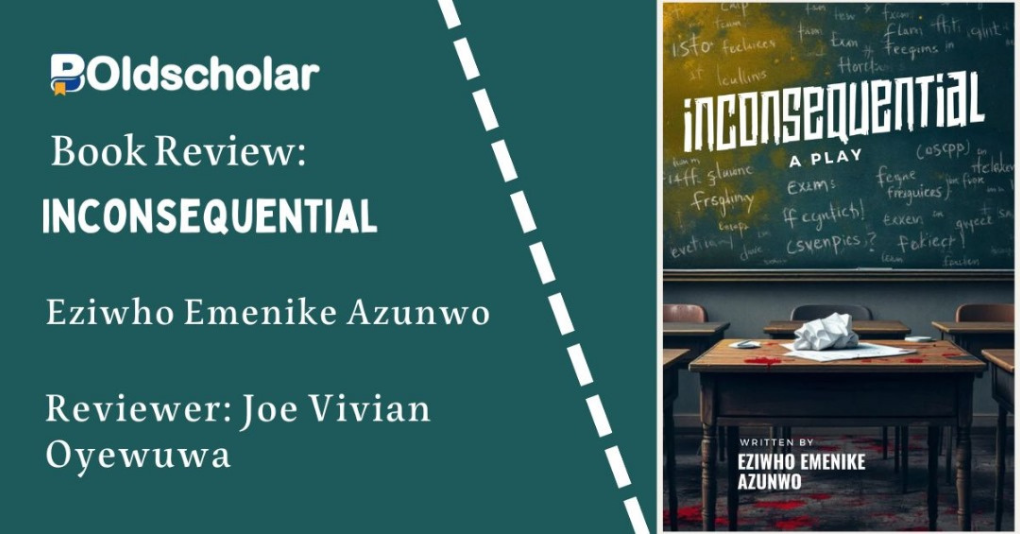Book Title: Inconsequential
Author: Dr. Eziwho Emenike Azunwo
Reviewer: Joe Vivian Oyewuwa
Publisher: Covenant Daystar Publishers
Pagination (number of pages) 66 pages
Year of Publication: 2025
Institution: Rivers State University, Port Harcourt,
Department of Theatre and Film Studies.
Introduction
Eziwho Emenike Azunwo’s Inconsequential (2025) is a socially engaging play that interrogates the Nigerian educational system and the broader culture of negligence and corruption that undermines the future of young people. Azunwo, an accomplished playwright and scholar with a significant body of socially conscious drama, here directs his attention to the systemic decay in one of the most crucial institutions of the nation: education. The play’s very title, Inconsequential, is deeply ironic, as it critiques the tendency of those in power to dismiss systemic failures as minor or insignificant, when in reality such failures have devastating, life-altering consequences.
The text situates itself firmly within the tradition of Nigerian protest drama and socially conscious theatre, drawing from naturalistic settings, emotionally charged dialogue, and symbolic interrogative structures to dramatize the tragic consequences of a failed examination system. As with many of Azunwo’s works, this play is less concerned with entertainment in the conventional sense and more with the ethical and social obligations of theatre as an instrument of reform. This review provides a critical examination of the play, considering its themes, narrative structure, characters, style, and social relevance, while situating it within the broader Nigerian and African dramatic tradition.
Synopsis
The play opens in the domestic space of the Alozie family, where Mrs. Alozie confronts her daughter Gift about her entrance examination results. Gift has scored poorly, achieving 153 in a test where at least 280 was required for her intended course of study. Her mother’s anger and disappointment reflect not just parental frustration but also the immense social and economic pressures placed upon young Nigerians navigating a broken educational system. The scene escalates with Gift’s tears and the looming dread of her father’s reaction.
The narrative quickly moves beyond the household to encompass the larger tragedy surrounding the examinations. Another mother, Mrs. Rose, is introduced at a police station, distraught over the kidnapping of her daughter Raechel, who disappeared while traveling far from home to sit for her exam, a journey necessitated by the lack of local accredited centers. Simultaneously, the broader society reels from news of a candidate’s suicide following mass failure in the exams. At the heart of the storm is Professor Ademola, the director of the examination board, who becomes the focus of ministry investigations and public outrage. His interrogations, both informal and before a larger panel, reveal a man ill-prepared to defend his institution, alternating between denial, excuses, and emotional breakdowns. The ministry, unconvinced by his tears and pleas, eventually suspends him and his board, holding them accountable for the catastrophic outcomes of their negligence.
The play concludes with a clear call for accountability, reform, and recognition of the devastating consequences of institutional failure.
Themes
Failure of Institutions: The central theme of Inconsequential is the collapse of institutional responsibility. Through the examination board’s negligence, Azunwo dramatizes how systemic dysfunction leads to ruined futures, family trauma, and even death. Professor Ademola embodies the archetype of the failed leader, evading responsibility until he is forced to confront the gravity of his failures.
Youth Vulnerability and Despair: The tragedy of Gift and Raechel illustrates the precarity of youth caught within unjust systems. Gift’s despair at her score, culminating in suicidal impulses, symbolizes how education, meant to empower, becomes a source of trauma when corrupted. Raechel’s kidnapping further underscores the physical dangers young people face when institutional failures push them into vulnerable circumstances.
Family and Generational Tensions: The Alozie family scenes foreground the pressures of Nigerian parents’ expectations on their children’s academic performance. Mrs. Alozie’s harshness reflects a generational fear of wasted investment, while Gift’s despair demonstrates how parental pressure exacerbates the psychological toll of systemic failure.
Accountability and Governance: The interrogations of Professor Ademola reveal the play’s critique of leadership without accountability. His evasive responses, frequent tears, and inability to produce records expose the culture of irresponsibility that pervades Nigerian institutions. The ministry’s firm handling of the case contrasts with his weakness, presenting a model albeit idealized of corrective governance.
Negligence and Corruption: Behind the examination scandal lies the implied misuse of funds, failure to provide local examination centers, and disregard for student welfare. Azunwo suggests that corruption is not always overt theft but also systemic negligence that produces equally catastrophic results.
Characterization
Professor Ademola: A tragic figure of failed leadership, Though ostensibly accomplished, with teaching experience abroad, his tenure as head of the board is marred by incompetence, negligence, and evasion. His frequent breakdowns into tears symbolize a corrupt leadership culture that substitutes emotional performance for accountability.
Mrs. Alozie: A stern matriarch, Mrs. Alozie represents parental authority in its authoritarian mode. Her treatment of Gift, simultaneously harsh and despairing, reveals the intense pressures Nigerian parents place upon their children in a society where education is perceived as the only gateway to survival.
Gift: Embodies the Nigerian youth, intelligent and hopeful, but trapped in a system that betrays their effort. Her low score, which she insists does not reflect her actual performance, hints at systemic manipulation of results. Her tragic trajectory is symbolic of countless disillusioned students.
Mrs. Rose: She is the archetype of maternal anguish. Her loss of Raechel to kidnappers dramatizes the vulnerability of children within a failed system. Her voice is the conscience of the play, representing the ordinary Nigerian parent crushed by institutional failure.
The Ministry Panel / Chairman: The panel serves as the play’s collective conscience, embodying society’s demand for justice. Through their rigorous interrogation, they expose the corruption, negligence, and incompetence of Professor Ademola and his board.
Language and Style
Azunwo employs a blend of naturalistic dialogue and heightened theatricality. Domestic scenes are marked by realistic family quarrels, while institutional scenes adopt interrogative and procedural language. The repeated breakdowns of Ademola into tears function both as character study and metaphor for a corrupt leadership class unable to take responsibility. The use of drumming and musical undertones punctuates scenes, connecting the play to African performance traditions while also heightening emotional tension. Stage directions are precise, ensuring that performances capture the realism and symbolic depth of the text.
Dramatic Techniques
Naturalism: Domestic and institutional scenes are grounded in realistic dialogue and action.
Interrogation as Structure: The panel hearings provide a courtroom-like dramatic framework, emphasizing accountability and truth-seeking.
Symbolism: Tears, locked doors, and travel distances become metaphors for systemic dysfunction.
Music/Drumming: Serves as emotional punctuation, connecting to traditional African dramaturgy.
Socio-Political Commentary
At its heart, Inconsequential is a political play. It addresses real issues in Nigeria’s education sector: mass exam failures, poorly managed exam boards, the burden of multiple examinations (WAEC, NECO, GCE, UTME), lack of credible centers, and the misuse of public funds. The play echoes actual controversies surrounding Nigerian educational institutions, dramatizing them in ways that force audiences to confront the human costs of bureaucratic failure.
It also raises questions of governance, leadership, and accountability, resonating beyond education to Nigeria’s wider political landscape. By portraying leaders who dismiss failures as “inconsequential,” the play critiques a culture where citizens’ lives are devalued.
Comparative Perspective
Azunwo’s play aligns with Nigerian protest drama traditions.. Like Ola Rotimi’s Our Husband Has Gone Mad Again or Wole Soyinka’s The Trials of Brother Jero. It uses satire, interrogation, and symbolic characterizations to critique societal dysfunction. Closer in spirit to Femi Osofisan’s activist plays and Azunwo’s own The Last Resort and Child’s Play, Inconsequential emphasizes the urgency of reform in social institutions.
Critical Evaluation Strengths
Timely engagement with pressing national issues. Emotional resonance through family tragedy and maternal anguish. Clear narrative structure moving from domestic, to societal, to institutional levels. Strong integration of African performance aesthetics (drumming, symbolism).
Weaknesses
Characters beyond the core figures (like Oyeka, Mr. Alozie, or minor officials) are underdeveloped. Professor Ademola’s tears, while symbolic, risk becoming repetitive. The play leans toward didacticism, sometimes prioritizing message over complexity. Nevertheless, the play’s strengths far outweigh its weaknesses, establishing it as a powerful piece of socially engaged drama.
Conclusion
Eziwho Emenike Azunwo’s Inconsequential is a poignant, searing critique of Nigeria’s failing education system and the broader culture of negligence and corruption. By dramatizing the personal tragedies of students and families against the backdrop of institutional failure, the play forces its audience to confront the devastating human cost of systemic irresponsibility.
As a work of socially engaged theatre, it continues the Nigerian tradition of using drama as a mirror for society and as a call to reform. In exposing the so-called “inconsequential” failures of institutions as matters of life and death, Azunwo has written a play that is as relevant as it is unsettling, a dramatic reminder that every decision within public service carries consequences for the lives of ordinary citizens.
Share this post





Be the first to comment on this post